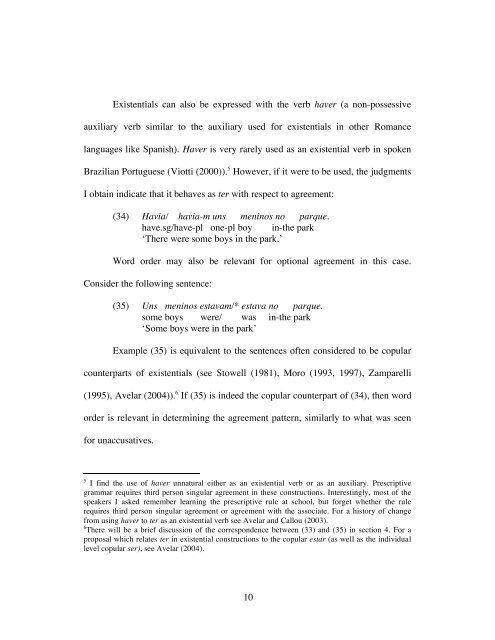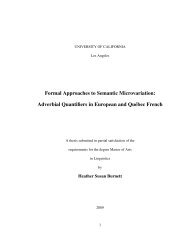Post Verbal Subjects and Agreement in Brazilian Portuguese
Post Verbal Subjects and Agreement in Brazilian Portuguese
Post Verbal Subjects and Agreement in Brazilian Portuguese
You also want an ePaper? Increase the reach of your titles
YUMPU automatically turns print PDFs into web optimized ePapers that Google loves.
Existentials can also be expressed with the verb haver (a non-possessive<br />
auxiliary verb similar to the auxiliary used for existentials <strong>in</strong> other Romance<br />
languages like Spanish). Haver is very rarely used as an existential verb <strong>in</strong> spoken<br />
<strong>Brazilian</strong> <strong>Portuguese</strong> (Viotti (2000)). 5 However, if it were to be used, the judgments<br />
I obta<strong>in</strong> <strong>in</strong>dicate that it behaves as ter with respect to agreement:<br />
(34) Havia/ havia-m uns men<strong>in</strong>os no parque.<br />
have.sg/have-pl one-pl boy <strong>in</strong>-the park<br />
‘There were some boys <strong>in</strong> the park.’<br />
Word order may also be relevant for optional agreement <strong>in</strong> this case.<br />
Consider the follow<strong>in</strong>g sentence:<br />
(35) Uns men<strong>in</strong>os estavam/* estava no parque.<br />
some boys were/ was <strong>in</strong>-the park<br />
‘Some boys were <strong>in</strong> the park’<br />
Example (35) is equivalent to the sentences often considered to be copular<br />
counterparts of existentials (see Stowell (1981), Moro (1993, 1997), Zamparelli<br />
(1995), Avelar (2004)). 6 If (35) is <strong>in</strong>deed the copular counterpart of (34), then word<br />
order is relevant <strong>in</strong> determ<strong>in</strong><strong>in</strong>g the agreement pattern, similarly to what was seen<br />
for unaccusatives.<br />
5 I f<strong>in</strong>d the use of haver unnatural either as an existential verb or as an auxiliary. Prescriptive<br />
grammar requires third person s<strong>in</strong>gular agreement <strong>in</strong> these constructions. Interest<strong>in</strong>gly, most of the<br />
speakers I asked remember learn<strong>in</strong>g the prescriptive rule at school, but forget whether the rule<br />
requires third person s<strong>in</strong>gular agreement or agreement with the associate. For a history of change<br />
from us<strong>in</strong>g haver to ter as an existential verb see Avelar <strong>and</strong> Callou (2003).<br />
6 There will be a brief discussion of the correspondence between (33) <strong>and</strong> (35) <strong>in</strong> section 4. For a<br />
proposal which relates ter <strong>in</strong> existential constructions to the copular estar (as well as the <strong>in</strong>dividual<br />
level copular ser), see Avelar (2004).<br />
10

















